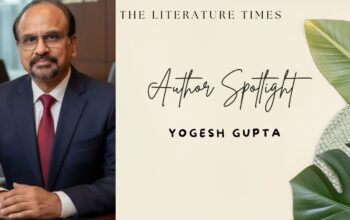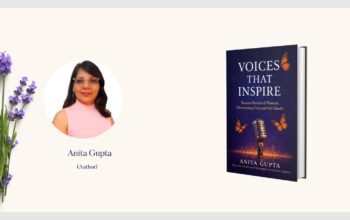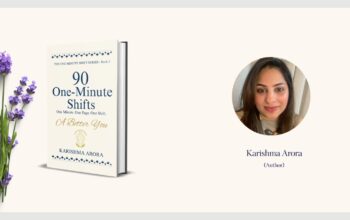Ashutosh Durgesh is not your typical author—he is a software engineer by profession and a philosopher at heart. Hailing from Madhya Pradesh, India, Ashutosh merges the analytical mindset of the tech world with a deep curiosity about the nature of knowledge, truth, and belief. His debut book, Knowledge, emerges from years of introspection, questioning, and a desire to understand the fundamental essence of “knowing” in a world saturated with information. Drawing wisdom from Indian philosophy, especially the Bhagavad Gita, as well as modern reasoning, Ashutosh presents a unique voice that is both rational and reflective. He invites readers into an inner dialogue—not to provide ready-made answers, but to encourage deeper questioning. In a time where information is abundant but true understanding rare, Ashutosh Durgesh offers a timely and transformative perspective.
The Literature Times: What inspired you to write Knowledge, and why did you choose this particular subject as your debut book?
Ashutosh Durgesh: Knowledge was born from my lifelong urge to question everything—what we believe, why we believe it, and whether it truly qualifies as knowledge. I chose this subject for my debut because all meaningful change starts with clarity of thought. In a world full of information, I wanted to explore what it really means to “know” something—beyond assumption, bias, or blind belief. This book is my way of helping readers—and myself—cut through the noise and think more clearly.
The Literature Times: As a software engineer, how did your technical background influence your philosophical thinking and writing style?
Ashutosh Durgesh: Being a software engineer trained me to think logically, break down complex problems, and look for patterns—skills that naturally influenced my philosophical thinking. In both coding and philosophy, clarity matters. My writing reflects that: structured, analytical, and focused on uncovering root causes rather than surface answers. I approach abstract ideas like a system—debugging beliefs, questioning assumptions, and aiming for rational consistency. That blend of logic and introspection shaped the voice of Knowledge.
The Literature Times: You draw from both Eastern wisdom and modern logic in your book—how do you balance these two seemingly different approaches?
Ashutosh Durgesh: To me, Eastern wisdom and modern logic aren’t opposites—they’re two lenses to look at the same truth. Eastern philosophy brings depth, subtlety, and inner awareness; modern logic offers structure, clarity, and critical analysis. I don’t treat them as competing forces but as complementary tools. In Knowledge, I use logic to question and analyze, and Eastern insights to deepen the reflection. The balance comes from not blindly following either—only what stands the test of reason and real experience stays.
The Literature Times: In a world overloaded with information, what according to you is the biggest challenge to gaining true knowledge?
Ashutosh Durgesh: The biggest challenge today isn’t lack of information—it’s filtering truth from noise. We confuse data with knowledge and opinions with facts. The real struggle is learning how to think, not just what to think. Our biases, echo chambers, and the speed of consumption make it harder to pause, reflect, and question deeply. True knowledge demands clarity, patience, and the courage to unlearn. That’s rare in a world addicted to instant answers.
The Literature Times: You often speak of questioning assumptions—can you share an example where questioning a belief led to a personal transformation?
Ashutosh Durgesh: One powerful moment came when I questioned the idea that morality is something inherited—passed down by culture, religion, or family. For years, I followed certain values without truly asking why. When I finally paused and examined them, I realized some weren’t mine—they were borrowed, untested, and even conflicting. That shift was uncomfortable but freeing. It led me to rebuild my moral framework from reason and reflection, not tradition. That experience shaped not just my thinking, but the entire foundation of how I live—and it heavily influenced my upcoming book on morality.
The Literature Times: How has writing this book changed your own perspective on knowledge and truth?
Ashutosh Durgesh: Writing Knowledge humbled me. I began with the desire to define truth clearly, but the deeper I went, the more I realized how layered and elusive it is. It taught me that knowledge isn’t a destination—it’s a process, often messy and uncertain. I became more comfortable with doubt, more curious than conclusive. Now, instead of seeking final answers, I focus on asking better questions. That shift—from certainty to clarity—changed everything.
The Literature Times: What role do you think ancient texts like the Bhagavad Gita play in our modern understanding of knowledge?
Ashutosh Durgesh: Ancient texts like the Bhagavad Gita offer timeless insights into the inner dimensions of knowledge—like self-awareness, duty, detachment, and discernment. In a world obsessed with external information, the Gita reminds us that true knowledge begins within. It teaches that knowing who we are is just as important as knowing what we know. For me, it bridges the gap between intellectual clarity and spiritual depth—something modern understanding often overlooks.
The Literature Times: The book encourages introspection and critical thinking—how do you suggest readers start cultivating these habits in their daily lives?
Ashutosh Durgesh: Start small, but start consistently. Set aside just 10 minutes a day to reflect—ask yourself not just what you believe, but why. Question your reactions, your assumptions, even your habits. Journaling helps, as does reading with the intent to challenge, not confirm, your views. Critical thinking isn’t about being skeptical of everything—it’s about being honest with yourself. Over time, this habit of introspection sharpens clarity and builds inner freedom. That’s where real knowledge begins.
The Literature Times: What message or feeling do you hope readers carry with them after finishing Knowledge?
Ashutosh Durgesh: I hope readers finish Knowledge feeling empowered to think for themselves—to question, to doubt, and to explore without fear. More than finding answers, I want them to embrace the journey of knowing as a lifelong adventure. True knowledge isn’t a final prize; it’s a way of living with curiosity, honesty, and courage. If the book sparks even a small shift toward clearer thinking and deeper awareness, I consider it a success.
The Literature Times: Are you planning to continue writing in the field of philosophy, or explore other themes in future books?
Ashutosh Durgesh: Philosophy will always be a core part of my writing because it helps me—and hopefully my readers—make sense of life’s biggest questions. That said, I’m also interested in exploring related themes like morality, anxiety, and practical wisdom that connect philosophy with everyday living. My next projects will dive deeper into these areas, blending rigorous thinking with real-world application. So yes, expect more philosophy, but also a broader look at how it shapes how we live.



